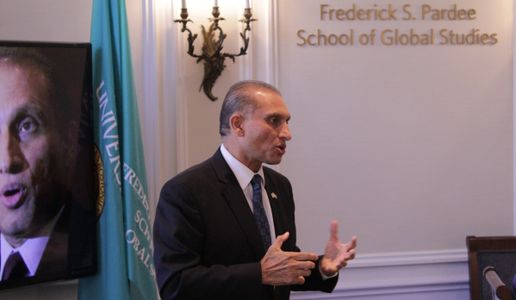Policy Leaders Forum: Amb. Aizaz Ahmad Chaudhry
Pakistan’s Ambassador to the United States, Aizaz Ahmad Chaudhry, was hosted by the Frederick S. Pardee School of Global Studies at Boston University on September 12, 2017 for a wide-ranging discussion covering topics including the global war against terrorism, the China-Pakistan Economic Corridor, India-Pakistan relations, U.S. President Donald Trump’s new Afghanistan strategy and the broader future of U.S.-Pakistan relations.
The event was part of the Policy Leaders Forum series at the Pardee School that brings senior international policy makers to Boston University for important policy conversations with faculty and students. Guests included faculty and experts from across Boston University.
Amb. Chaudhry began by providing context to the flux at both the global and regional levels that currently shapes the relationship between the United States and Pakistan.
“We have Afghanistan still in turmoil, we have Pakistan’s relations with India still tense, we have an uneasy peace between China and India, there are question marks over the nuclear deal with Iran, and new sanctions imposed by the United States on Iran,” Amb. Chaudhry said. “This flux at the global level and conflict and turmoil at the regional level, where is it that Pakistan stands and where is it headed?”
Amb. Chaudhry said he believes that the relationship between the United States and Pakistan has generally been a positive and productive one, but that there is currently a lack of trust between the two countries that needs to be addressed.
“We’ve had long periods of working together that has seen ups and downs, I would say more ups than downs, but no doubt there have been downs and the period we are passing through is one,” Amb. Chaudhry said. “We think that there is a big trust deficit between the two countries, and that needs to be worked on. It’s been a broad-based relationship, a relationship which has roots in the people-to-people context — from education, health, IT, commerce, counterterrorism to defense.”
A large portion of the conversation was devoted to U.S. President Donald Trump’s recently announced Afghanistan strategy, how the announcement was received in Pakistan, and the impact the strategy would have on the region.
“One of the biggest issues where we are interacting with the United States is on Afghanistan,” Amb. Chaudhry said. “After the announcement of the new strategy by President Trump the people of Pakistan felt that the blame for U.S. failure in Afghanistan has been heaped on Pakistan. People feel offended that our sacrifices and achievements have been brushed aside.”
Amb. Chaudhry said Pakistan is eager to continue working with the United States on the issue as achieving peace in Afghanistan remains a significant common objective between the two countries.
“The government of Pakistan is keen to work with the United States government to make peace in Afghanistan,” Amb. Chaudhry said. “We think it is a common objective because while the United States has its own reasons to bring peace to Afghanistan, we are the ones who have suffered enormously from the instability.”
The Policy Leaders @BUPardeeSchool series brings senior international policymakers to Boston University for conversations with faculty, students and guests. Previous speakers in the series have included, the Dr. Rukakana Rugunda, Prime Minister of Uganda, the former Governor of Kentucky, Steve Beshear; Dr. Tal Becker from the Israeli Ministry of Foreign Affairs, Dr. Woo Yoon-keun, Secretary General on the National Assembly of South Korea; and Senator Sheldon Whitehouse from Rhode Island.
